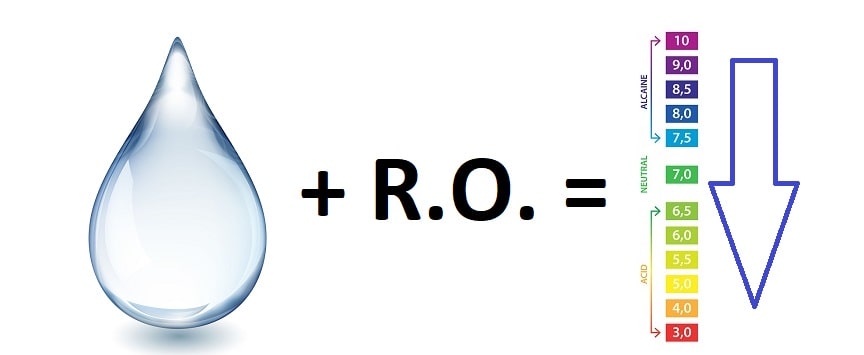Your reverse osmosis water tastes great, and you have a water softener, so your water feels great too. You have noticed that when you boil your softened water, you get a ring around the pot, but not with your reverse osmosis water.
Is Reverse Osmosis Water Hard Or Soft? Reverse osmosis will remove hardness from water, making it soft. But many reverse osmosis systems have a remineralization stage which will add hardness to the water after the reverse osmosis process. Water should be softened before the reverse osmosis system to prevent damage to the membrane.
You know that the water coming from your reverse osmosis system is healthier because the majority of the sodium has been removed, but what about other minerals that make water hard, does your reverse osmosis soften water?
Water from a reverse osmosis drinking water system is normally soft, but it may have some hardness in it and here’s why.
First of all, the water going into your reverse osmosis system should be softened because hard minerals in the water will build-up on the reverse osmosis membrane causing a scale that will prevent the membrane from filtering your water.
Having a properly working water softener in your home is an important part of protecting the water fixtures in your home, and protecting your reverse osmosis system.
If you have a water softener but have not tested your water to make sure that it is soft in quite a while, you can do so with a simple to use water hardness test kit.
You should test the tap water coming from the faucet that is providing water to your reverse osmosis system as other faucets may not have softened water going to them.
If you know that iron is present in your water, you should also test that the water feeding your reverse osmosis is free of iron. Getting a basic water testing kit, will provide you with hard water, and iron testing in one kit.
My reverse osmosis water is hard, but my tap water is soft, how can that be?
Many people enjoy their reverse osmosis water because it has a crisp and clean taste to it, but other people prefer that their water has some flavor to it. By adding certain minerals to your reverse osmosis water, it can taste different.
For more on how certain minerals can affect the taste of water, check out my article What Does RO Water Taste Like? And Why!
Because the process of reverse osmosis removes minerals from the water that neutralize the acid in the water, the final product water that comes out of the faucet will be acidic.

Although reverse osmosis water is just mildly acidic, many people choose to get a reverse osmosis system that uses a calcium mineral stage to remineralize the water and neutralize the acid in the water.
While having an extra stage to add flavor to the water and reduce acid works great, it does add a small amount of hardness back into the water.
This is why you may test your tap water and find it to be perfectly soft, but your reverse osmosis water may contain some hard minerals in it.
For example, if you were to test the water from a basic reverse osmosis system, and also from a remineralizing reverse osmosis system, you may find the water to be soft from one, but not the other, just because of the addition of the remineralization stage.
Example of potential water test results from reverse osmosis systems with and without an additional remineralization stage.
Incoming water test results: Hardness 0, pH 7.5, TDS (Total Dissolved Solids) 100
Basic reverse osmosis system potential test results: Hardness 0, pH 6.5, TDS 5
Remineralization reverse osmosis system potential test results: Hardness 3, pH 7.2, TDS 8
So as you can see, there can be a significant difference between the water produced by a basic reverse osmosis system and a reverse osmosis system with an additional remineralization stage.



Well water still hard leaving white deposit at refrigerator water dispenser after passing thru water softener and 5 stage reverse osmosis.
Can you give suggestions as to problem ?
Thank You
Hello Carroll and thank you for the question.
Without being there to test your water, I can’t be sure what is happening, but it may not be hard water at all. Try cleaning the white deposit just using water, if it comes clean easily, it may be salt residue and not hardness. The sodium content in well water can sometimes fluctuate quite a bit and a water softener will not remove sodium from your water and your reverse osmosis may not be able to remove all the sodium.
If you find that the white deposit does NOT clean off easily with just water, it may be hardness which could mean that the water softener resin inside of your water softener is no longer able to remove hard minerals from your water, or perhaps the resin has worked its way out of your water softener.
If you have seen tinny sand-like sediment in your water it could be water softener resin escaping from your water softener.
I suggest that you contact a local water treatment company to discuss having your water softener checked.
I hope this was helpful.
Paul